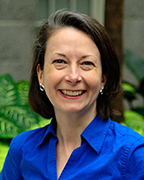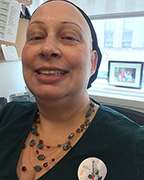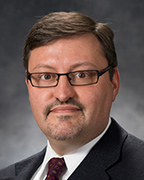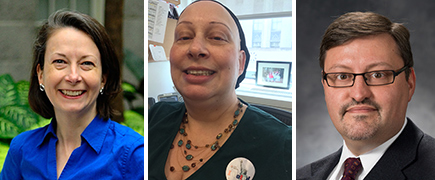Kate Lang ’99, Amy Loprest ’95, and Brian Maxey ’99 have been engaged in public service legal work for decades, since graduating from Fordham Law School and the Stein Scholars Program. Find out what they do and what inspires them to continue to give back.
Kate Lang ’99, Senior Staff Attorney, Justice in Aging
I am a senior staff attorney with the economic security team at Justice in Aging (formerly the National Senior Citizens Law Center) and have been in this job for about three-and-a-half years. I focus on Social Security and Supplemental Security Income for low-income seniors, but,  since those programs also serve other constituencies, our work has an impact on other populations, such as people with disabilities. I spend a lot of time providing technical assistance and case support for legal services attorneys across the country. I conduct trainings, work in coalition with advocates on administrative advocacy at the Social Security Administration on a variety of issues, and occasionally participate in class action litigation and amicus briefs. I also field a lot of questions from attorneys who are trying to make sure that what SSA is saying and doing is correct. Sometimes attorneys call to share observations with me when they start to see an increase in a certain type of case or a trend. Occasionally I get calls directly from individuals trying to navigate the system. I refer those individuals to local advocates, as we don’t take on individual clients. I think of the advocates located throughout the country as my clients.
since those programs also serve other constituencies, our work has an impact on other populations, such as people with disabilities. I spend a lot of time providing technical assistance and case support for legal services attorneys across the country. I conduct trainings, work in coalition with advocates on administrative advocacy at the Social Security Administration on a variety of issues, and occasionally participate in class action litigation and amicus briefs. I also field a lot of questions from attorneys who are trying to make sure that what SSA is saying and doing is correct. Sometimes attorneys call to share observations with me when they start to see an increase in a certain type of case or a trend. Occasionally I get calls directly from individuals trying to navigate the system. I refer those individuals to local advocates, as we don’t take on individual clients. I think of the advocates located throughout the country as my clients.
An example of a class action litigation we were recently involved in happened last year when we sued on behalf of SSI recipients who were in same-sex marriages. It took the SSA a long time to figure out how they were going to treat those marriages after the Supreme Court decision in Windsor. Once same-sex marriages were recognized by SSA, a spouse’s income was counted, which caused some recipients to become ineligible for SSI. SSA started issuing overpayment notices for all the benefits they had paid out while they were figuring out what they were going to do about SSI recipients in same-sex marriages. We sued, claiming those people were not at fault so they should not be required to pay anything back and that the SSA shouldn’t even generate those notices in first place. The SSA was reluctant to implement a blanket policy and instead wanted each individual to be required to submit a waiver application. The court dismissed our complaint and ruled in SSA’s favor by finding that our plaintiffs had to go through the waiver process, but this March the SSA issued a policy statement saying they were going to waive these overpayments without requiring these individuals to go through the waiver process, so, although we lost the litigation, we won the war.
Before I joined Justice in Aging, I was at Maryland Legal Aid working in an elder law and public benefits unit, where I mostly represented people 60 and over on a wide range of issues, such as foreclosures, consumer law, bankruptcies, and public benefits. Prior to that, I worked at the National Legal Aid and Defender Association for five years in their civil legal aid program. While there, I tracked federal funding for legal aid programs and organized conferences and trainings. There was a period of about two years when I first moved to the D.C. area in 2002 when I was essentially unemployed, though I spent much of that time as a volunteer in Bread for the City’s legal clinic engaged with landlord tenant cases. I eventually took a job with a small firm that only represented people applying for Social Security disability benefits, but I quickly realized that that job was not for me, and I secured the job at National Legal Aid and Defender Association.
My current position is my dream job. There is nothing else I can imagine wanting to do, and I hope I get to continue here for the rest of my career. I feel so fortunate to be able to do this type of work. Not only is it an area of law that I really enjoy but I also get a lot of satisfaction out of having the opportunity to develop a deep substantive expertise in one area of law. Previously, I was spread thin and covered multiple areas of law. I also enjoy conducting the trainings, teaching others, and helping them be better lawyers for their clients. Finally, I appreciate knowing that what we are doing can reach lots of folks at once as opposed to one person at a time through individual representation. I do miss being able to help individuals and the feeling you get when you make a difference in someone’s life with whom you have built a relationship. The work I do helps a lot of people at once, but I don’t actually know who they are and they don’t know that I exist.
Doing this type of work very much aligns with my own values and is why I went to law school in the first place, so it has not been a struggle to sustain the commitment. Also, my family, friends, and colleagues support those values and my commitment. For example, when I was at the firm, a friend encouraged me to leave because it wasn’t really the type of work I set out to do when I went to law school. She started to send me job announcements and she was the one who helped me get my next job at NLADA. Your community helps keep you on the right path, so it is important to maintain those relationships.
I have been very fortunate that I have worked at places that respect maintaining a work/life balance. I also think I have clear boundaries in this area and have stayed firm. My supervisors have regularly supported me by, for example, reminding me that when I go on vacation I am really on vacation. When my kid has been sick, no one has challenged my need to take time to be at home. I never experienced push back, and I was never told taking care of my family should not be a priority.
I do think it is important to recognize that things don’t always work out how you think they are going to, and that’s OK. Setbacks and roadblocks don’t mean personal failure, and you will find your way forward each time. Don’t beat yourself up or feel as if you have let yourself down. Life is not simple or straightforward. My path has been different than what I imagined, and I needed to be adaptable and remember to keep people in my life who will help me figure out what plan B will look like once plan A didn’t work out. If you don’t get your dream job right away, roll with it. It doesn’t mean you are a failure or that your dream job is not waiting for you around the corner or down the road.
Amy Loprest ’95, Executive Director, New York City Campaign Finance Board
I am the executive director of the New York City Campaign Finance Board. I have held this position almost ten years. Prior to becoming the executive director in September 2006, I held various positions with the agency since May 1998. I have been working here a long time. There is only one reason for this. I love the work, and I believe in the mission.
 The CFB is an independent New York City agency that works to empower New Yorkers to make a greater impact on their elections. We do that through one of the strongest and most effective campaign finance systems in the country. The city’s matching funds program amplifies the contributions of regular citizens by matching them $6-to-$1 up to $175 with public funds. This means that New Yorkers—and not special interests—are the largest contributor to city officials. We provide transparency to the campaign finance process through our public disclosure of money raised and spent by candidates and independent spenders. Our NYC Votes campaign engages and educates voters through community outreach, the voter guide, and our debate program. We also work to improve the voter experience by advocating for legislative changes to the registration and voting process. On May 3, two hundred of our Vote Better NY volunteers went to Albany to ask for changes such as online registration, a later registration deadline, and early voting, which most other states already have. They brought with them a petition signed by more than 6,500 New Yorkers. We also created and produce the “I Voted” stickers you now receive when you vote in New York City.
The CFB is an independent New York City agency that works to empower New Yorkers to make a greater impact on their elections. We do that through one of the strongest and most effective campaign finance systems in the country. The city’s matching funds program amplifies the contributions of regular citizens by matching them $6-to-$1 up to $175 with public funds. This means that New Yorkers—and not special interests—are the largest contributor to city officials. We provide transparency to the campaign finance process through our public disclosure of money raised and spent by candidates and independent spenders. Our NYC Votes campaign engages and educates voters through community outreach, the voter guide, and our debate program. We also work to improve the voter experience by advocating for legislative changes to the registration and voting process. On May 3, two hundred of our Vote Better NY volunteers went to Albany to ask for changes such as online registration, a later registration deadline, and early voting, which most other states already have. They brought with them a petition signed by more than 6,500 New Yorkers. We also created and produce the “I Voted” stickers you now receive when you vote in New York City.
Aside from my love of the work, the other thing that has kept me going all these years is the changing nature of the work. Before I became executive director, I held four different titles from associate counsel to assistant executive director. These role changes kept my work fresh. Now I have been ED for ten years, and I still am learning. The mission of the agency has expanded over the years, which has had me learning new roles. In addition, I try to keep an open mind and to learn how to do my work better every day.
Sometimes it is difficult to stay enthusiastic. Corruption scandals at all levels of government make voters cynical and depress voter turnout. When you work in anti-corruption, it makes you lose heart. One thing everyone working in public interest has to keep in mind is that you cannot solve all the problems of the world, not even in the small sector of the world you work in. But you need to know that every day you are making some difference however small. I believe in my work and so it keeps me going.
It really helps when you work with intelligent, hardworking people who share your enthusiasm and sense of mission. This is one of the main differences I find in public service work. Don’t get me wrong, I worked with some brilliant and dedicated people before entering public service. But as important as it is to do good work for your client, it is hard to bring the same enthusiasm as when you are working for the public good.
My advice for those who are starting a career in public service is to find an area you find interesting. Engage with others in the same field. Not only will this networking perhaps help you later in your career but learning from others, particularly people who do not necessarily share your views, will build your capacity and allow you to take on new challenges. Finally, don’t be afraid to take on those new challenges when they are presented. I moved from a legal-focused career to a management-focused career only five years after graduating from law school. I had spent those years clerking for a federal judge, working at a major law firm, and working as an agency lawyer. Many people advised me that I was making a mistake. I was willing to take the risk and face that new challenge, and I have never looked back in regret. Those research, writing, analytical, and critical thinking skills that I learned in law school, while not directly applied in the practice of law, have made me a better manager than I would have been without them. Do I love my job every minute of every day? Honestly, no, but lucky for me, whenever I am feeling demoralized an election day comes. Then I see all the people wearing I Voted stickers and I think, “I made that happen,” and I smile.
Brian Maxey ’99, Chief Operating Officer, Seattle Police Department
Those who knew me at Fordham as a children’s rights enthusiast would likely be surprised that I now work in law enforcement. After law school, I worked at the Vera Institute of Justice and the Fund for Modern Courts working on jury and family court reform; then I moved on to parks development at Friends of Hudson River Park. I married in 2002 and my wife and I moved to the Pacific Northwest where I took a job  with the Washington State Attorney General’s Office. I expected to work in human and health services but was assigned to the Criminal Justice Division, representing the Washington State Department of Corrections. Initially, I was uncomfortable with this assignment because I clearly had biases about law enforcement and corrections, but then I got to understand the culture and found that I had a knack for translating between law enforcement and communities (including juries). I have now litigated over 200 civil rights cases for Washington State Department of Corrections (WADOC), NYPD (at Corporation Counsel), and the Seattle Police Department (at the Seattle City Attorney’s Office). Since the Department of Justice investigation in 2011, I have been very involved in the consent decree in different roles. In 2014, Chief Kathleen O’Toole brought me in-house as counsel to SPD and in 2015 asked me to assume the role of chief operating officer, which is a non-legal role at the rank of deputy chief.
with the Washington State Attorney General’s Office. I expected to work in human and health services but was assigned to the Criminal Justice Division, representing the Washington State Department of Corrections. Initially, I was uncomfortable with this assignment because I clearly had biases about law enforcement and corrections, but then I got to understand the culture and found that I had a knack for translating between law enforcement and communities (including juries). I have now litigated over 200 civil rights cases for Washington State Department of Corrections (WADOC), NYPD (at Corporation Counsel), and the Seattle Police Department (at the Seattle City Attorney’s Office). Since the Department of Justice investigation in 2011, I have been very involved in the consent decree in different roles. In 2014, Chief Kathleen O’Toole brought me in-house as counsel to SPD and in 2015 asked me to assume the role of chief operating officer, which is a non-legal role at the rank of deputy chief.
For me this is an incredible time to be in law enforcement. The profession is evolving nationally to recognize that policing is mostly not about enforcement, but service, and I am very proud that Seattle is leading the way. Our officers are on track to make 10,000 interventions with people in crisis this year and are consistently doing so with respect and minimal reliance on force. We have integrated de-escalation in policy, training, and practice and have moved toward a model of much more thoughtful policing overall. Although policing was, looking through my law school eyes, an unexpected track for me, I am very fortunate to have an opportunity to significantly advance policing both locally and nationally.
Since law school, I have learned that most issues are nuanced. Getting to the “truth,” which is not necessarily the focus of litigation, can be difficult and takes patience and an open mind. We all hold assumptions and biases that need to be continually challenged. My experience is that a career is a journey—an often unintentional one—and if you are overly focused on the path you think is right for you, you may well miss unexpected opportunities.

